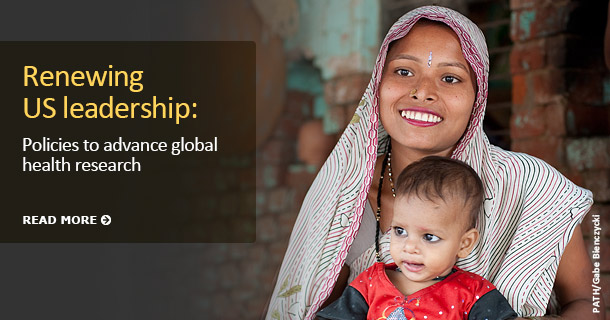Kim LufkinGHTC
Kim Lufkin is a communications officer at GHTC.
We have long known that Washington is operating under a remarkably unorthodox budgetary process. Sequestration threatens to reduce funding for most federal programs by at least five percent. More than halfway through the current fiscal year, policymakers still haven’t completed work on the 2013 budget. They will likely be finishing budget negotiations for this year as they start the process all over again for 2014. These tense and uncertain budgetary circumstances in Washington are placing enormous constraints on research and development (R&D) efforts to develop new and improved vaccines, drugs, and other tools for global public health.
In the midst of these critical federal budget decisions, the Global Health Technologies Coalition (GHTC) is releasing our fourth annual policy report. We believe that sequestration and the federal budget present the United States with the opportunity to take two decidedly different paths. Policymakers can renew the nation’s longstanding role as a leader in supporting global health R&D by preventing sequestration and protecting research funding in the federal budget. Alternatively, policymakers can place this leadership role at risk by allowing sequestration to take place and reducing investments in global health R&D in the federal budget.

Congress and the Obama administration are not in an enviable position—they are facing incredibly challenging decisions regarding the budget. They must set priorities for the country and provide funding for them. In these times of fiscal constraint, policymakers need to be even more discerning and invest in essential activities that not only save lives and improve health worldwide, but also provide jobs and reap other rewards at home.
Our policy report proves that global health R&D unquestionably meets all of these goals. Previous US investments in research to develop new vaccines, drugs, diagnostics, microbicides, devices, insecticides, and other tools have led to some of the greatest advances in global health to date, saving countless lives and resulting in billions of dollars in cost savings. With increased investment and support from the US government, further gains are within reach for HIV and AIDS, malaria, tuberculosis, neglected tropical diseases, maternal and reproductive health, and childhood survival.
Global health research also drives US job creation and economic growth, while protecting the health of American citizens who are increasingly at risk of global infectious diseases. For instance, there are an estimated five million impoverished Americans who live with neglected tropical diseases, including a previously hidden burden of neglected diseases among the poor in the southern United States. Supporting research to develop new vaccines and drugs will help fight these diseases both at home and abroad.
Our report provides actionable steps that Congress and the administration can take to protect global health R&D in the upcoming budget negotiations. The report also provides clear recommendationsfor how the US government can increasingly coordinate its global health research activities—which stretch across multiple agencies, branches, and departments—around a cohesive strategy.
In the coming months, policymakers have the opportunity to set a course for renewal by ensuring that the nation’s fiscal policies and international development programs support research and innovation for global health. The reasons are clear, and there is too much to lose by pulling back now.
The GHTC’s fourth annual policy report can be found online. The report will be released today at a Capitol Hill briefing.